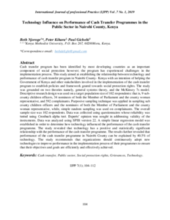Displaying 151 - 160 of 579
In this study, the authors surveyed one hundred 4- to 11-year-olds removed from home because of maltreatment about their placement preferences. These results suggest that young children may express more mature preferences than recognized by the law, and that there may be value in asking even relatively young children about with whom they would like to live following removal from home as a result of maltreatment.
The objectives of this study were: (a) to measure the time-to-initial placement change in different types of settings, including non-relative foster homes, kinship care, residential treatment centers (RTC), group homes and other types of settings; and (b) to identify predictors of the initial placement change.
The purpose of this study was to establish the relationship between technology as a capacity building strategy and performance of the orphans and vulnerable children cash transfer program in Nairobi County, Kenya.
This chapter from the book Re-Visioning Public Health Approaches for Protecting Children considers how the outcomes of alternative care and treatment in child protection can be assessed and the potential promise of public health approaches to child maltreatment.
This new guide can assist child welfare agencies in planning and implementing best practices in foster parent recruitment, development and support. It features six key drivers for driving better results and offers specific strategies for achieving and sustaining excellence in foster parenting.
This study reports on a qualitative investigation involving 15 young kinship care alumni in Ghana to explore what kinship caregivers' unpreparedness means and what causes them to be unprepared.
The Care Pathways and Outcomes Study is a longitudinal study following 374 children who were in care and under five years old on 31/3/2000 in Northern Ireland. The study followed where the young people ended up living, whether they returned to their birth parents, went into kinship or non-relative foster care, or were adopted.
This report describes lessons learned from a centerpiece of Home Away From Home: coaching, technical assistance, and data analysis activities aimed to improve the recruitment, training, support and retention of foster homes and build kinship caregiving capacity.
As technology enhancements effectively augment family-based interventions, the purpose of this study was to pilot a smartphone application (app) in the context of a trauma and behavior management-informed training for foster and kinship caregivers.
This is the 1st presentation in our Kinship Care in Brazil mini-series. Here, Ana Angélica Campelo of Brazil’s Ministry of Citizenship, shares an overview of the social welfare system in Brazil and how kinship care fits within it.



